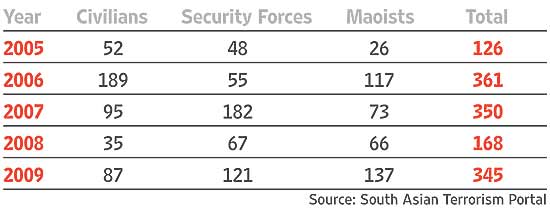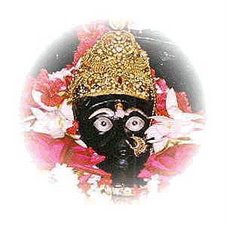 Tribhuvan Tiwari A ready mask Throughout the interview, Badru, commander for the Durba area, sat with his back to the camera. The woman and other subordinates took positions behind trees to ward off any intrusions. Women comprise almost half the armed contingents. bastar A Shiver Runs Through It The innocent tribal stands hapless in the crossfire between the State and the Maoists, losing life and livelihood in a war without end
Chhattisgarh Maoist-related fatalities: 2005-2009
According to state police, however,
According to villagers, around 40 civilians (which would include what the government describes as suspected Maoists/Maoist sympathisers) are killed a week in the area.
...And The Cool Of Ash Almost haven The setting is idyllic in the lengthening shadows, but the calm in Gorgondarengapur is quite recent. Like many others, this woman and child had fled to Andhra Pradesh fearing the Salwa Judum. They returned only a few weeks ago. We fly into Raipur, the advice given by civil rights activists ringing in our ears: be careful which hotel you check into, since most report any arrivals—especially of journalists—to the local police. It’ll be very hard to get into the conflict zone in Bastar without being followed, harassed and thrown out by the Special Police Officers (SPOs). Our contact in Dantewada district—Ground Zero of the war being fought between the State and the Maoists—advises us to take the overnight sleeper bus, rather than a car, to Kirandul. As we weigh our options, we decide to visit a prosperous Vanvasi Kalyan Kendra (an RSS affiliate) leader I have met before in Raipur. It’s a happy choice: within minutes, his living room fills up with local politicos-cum-businessmen, interestingly a cross-party mix. A Congress municipal councillor, who runs a bus service among other things, says private business is prospering in all the Maoist-affected districts. What about the Maoists, the class enemies of big business? He laughs. “If the government wants,” he says, “the Maoists can be finished off very quickly. But no one wants that—neither the BJP nor the Congress. Go and see for yourself. And the traders and businessmen who live there are so happily ensconced there that they don’t want to leave.” I turn to our host: he nods in agreement, as does everyone in the room. Most businessmen in the state, they say, pay their “taxes” to the Maoists and, in return, are permitted to function unmolested. Later, in Jagdalpur, Pawan Dubey, editor of two local papers, confirms this. “Most businessmen,” he tells us, “have patrons among the state ministers, getting contracts, for instance, for building roads under the government’s Gram Sadak Yojana in Bastar, roads that are never built—so it’s a cosy arrangement.” CPI (Maoist) politburo member Kishenji confirmed as much in an interview last year—that the Maoists regularly collect taxes from “the corporates and the big bourgeoisie”.
| |||||||||||||||||||||||||||||||||||||||||||||||||||||||||||||||
Subscribe to:
Post Comments (Atom)











No comments:
Post a Comment